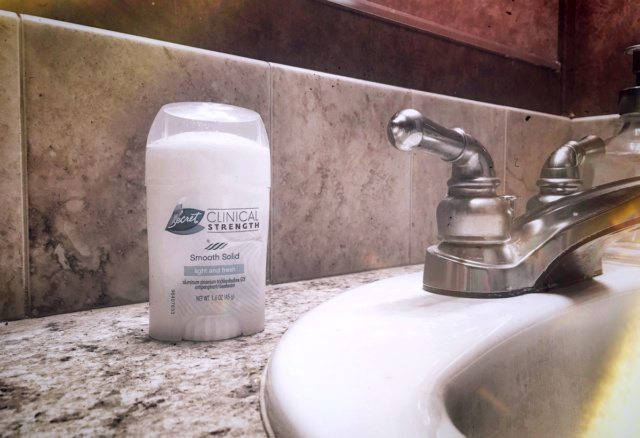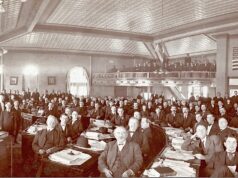TISHOMINGO, Oklahoma — Sweat stains darkened the fabric of my shirt, stretching from the seam of my sleeve down to my upper waist. A comical scene, right? Not so much. I was a shy, self-conscious 11-year-old, standing before the middle school bathroom mirror. That reflection was a reminder of the humiliation I couldn’t escape: My family was too poor to afford deodorant.
Poverty has long been a constant in Oklahoma. Last year, when acclaimed New York Times columnist Nicholas Kristof held his annual Win-A-Trip contest, which enables college students to accompany him for on-the-ground reporting in developing countries, instead of going overseas, he brought the group to Tulsa.
His findings led him to surmise that Oklahoma policies have “… resulted in a layer of destitution that echoes poverty in countries like Bangladesh.”
As a preteen, I’d never heard of Bangladesh, nor its poverty, but I did know that my family’s inability to afford basic things like toilet paper and sanitary napkins created a near-constant state of what I call “cognitive noise.” I found it hard to focus in class because my brain was inundated with more internalized issues, things like: “My scalp is oily and itchy …”, “My back teeth hurt, and my gums feel sore …”, “Crap, my cuticle cracked again — it’s red and inflamed, but I don’t have a daggum Band-Aid, let alone ointment …”, “Why can’t I stop sweating?! I’m sticky and uncomfortable and …”, “Why is that girl sitting next to me looking at me? Can she smell me?”
A part of me had hoped that — once I became an adult, once I went to college, graduated and began working on my own, once I could afford to buy toiletries without a second thought — the problem would pass. I hoped young people in general would no longer have to worry about such things in an age of so much wealth, technology, Apple watches and self-driving vehicles.
I deluded myself.
The items too embarrassing to list
This became clear to me after a conversation with my sister-in-law, Amanda, a high school English teacher. It was just around Christmas, and I had lamented how I was unable to snag any Angels from the school’s Angel Tree program.
“A hazard of living in such a charitable community,” I quipped. But Amanda didn’t laugh.
Instead, she looked at me seriously and said that what her students needed the most were the items they were too embarrassed to write on the Angel Tree request form: hygiene products.
It was an existential moment. A shameful one. I had let myself forget.
I had let myself believe that Oklahoma poverty in the 1990s was different from poverty in our state today.
In lieu of donating to the Angel Tree program, my husband and I instead bought toiletries for the young adults in our community. My sister-in-law made me a list:
- shampoo
- conditioner
- lotion
- lip balm (for cracked lips)
- deodorant
- sanitary napkins
- toothbrushes, toothpaste and floss
- soap and body wash
- socks
- Band-Aids, Neosporin and hydro-cortisone cream
So there I was, 20 years later, strolling the beauty aisles in Wal-Mart. I pushed the cart around a display of L’Oréal mascaras and toward the fifth item listed in the checklist she gave me: deodorant.
Scanning the options that ranged from $1 tubes to $10 “prescription strength antiperspirants,” I settled on the cheaper version so I could buy more. I counted out 10 tubes of Speed Sticks. As I dropped my haul into the cart, I realized I had tears dripping from my cheeks. I wiped my face and took a breath.
They were not cathartic tears. They were tears of anger, bordering upon hurt. How, after 21 years, is this still happening?
Follow NonDoc:
‘She could smell me, and it made her head hurt’
Another memory came to mind. I was standing alone in the girls’ locker room, the echo of basketballs bouncing in the adjacent court. A few days or maybe a week before, my best friend Lauren told me she could smell me, and it made her head hurt. She wasn’t trying to embarrass me. She suffered from migraines, and she was just trying to tell me the truth. Before me on a bench lay Lauren’s open gym bag, her stick of deodorant peeking out.
All I wanted in that moment was to go through one day without constantly feeling like a dirty person. I took the deodorant and ducked into a shower stall to swipe my armpits. I felt like a criminal, holding that deodorant stick in my hand. It’s an image that almost makes me laugh now. (Almost, but not quite.) I remember being worried about my film of sweat on Lauren’s deodorant. I knew sweat had bacteria, and that made me feel guilty. I used a square of toilet paper to wipe my germs off the stick, and I placed the deodorant back into Lauren’s gym bag.
Later that day after classes, I opened my locker to grab my backpack and head home.
Lauren’s stick of deodorant was sitting inside. She had seen me.
It was our secret. She never made an issue about it, and for that, I was both grateful and embarrassed.
Puberty is hard enough without being poor
For the second year in row, our state is confronted with revenue failure, a budgetary hole that amounts to nearly $900 million, according to a recent NonDoc article. Cuts to programs that help the poor are inevitable.
Amid these cuts in such a glaring surfeit of need, the questions I have feel almost indulgent to ask: What about the children? What can be done to address the aspects of poverty they are too embarrassed to talk about? And what can we do to give them the dignity they deserve?
Puberty is hard enough without being poor. Right now, just as for the past two-plus decades, cognitive noise is limiting the potential of children with intelligence, talent and ambition. They are the victims of complacency, of a state that not only persists in refusing to fund programs that benefit the poor, but that repeatedly puts the wants of the wealthy before the needs of the voiceless.
Obviously, it’s up to us.






















